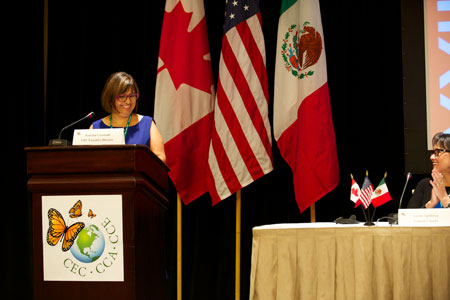Originally published March 15, 2016
By Leonard Martinez
UTEP Communications
Being a professor and an executive director of an international environmental commission seem like they couldn’t be more different.
Irasema Coronado, Ph.D., sees ways they are quite similar.
Coronado’s three-year stint as executive director of the Commission for Environmental Cooperation (CEC) Secretariat in Montreal, Quebec in Canada recently came to an end and she is back at The University of Texas at El Paso.

“I always try to steer people in the right direction,” said Coronado, a political science professor. “It is my personal policy to help people, whether they need to find a building, understand a policy, or if you need to help them access the right level of government, or the right institution, or give them a possible solution.”
The CEC is a tri-national organization through which Canada, Mexico and the United States collaborate on the protection, conservation and enhancement of North America’s environment.
“It was really challenging and interesting and I learned a lot,” Coronado said of the CEC experience in Montreal. “The commission is there to promote environmental cooperation among the three countries. In many ways you’re an international public servant because you serve the three countries equally, and so you have to embrace the North American perspective.”
Part of Coronado’s job was to help the three governments fulfill their obligations under the North American Agreement on Environmental Cooperation (NAAEC), a parallel accord to the North American Free Trade Agreement.
Established under the NAAEC in 1994, the CEC implements projects and oversees grants under its cooperative work program. It receives citizen input on environmental issues through its 15-member Joint Public Advisory Committee, which is the committee to which President Barack Obama originally appointed Coronado in 2010.
“The expertise and commitment these men and women bring to their roles will make them tremendous assets to my administration,” Obama said of the appointees at the time.
The CEC also manages a Submission on Enforcement Matters through which citizens can raise concerns about the effective enforcement of environmental laws in North America.
“All of that was very exciting and very enriching,” Coronado said.
Coronado was selected for the position in part because of her extensive environmental experience – particularly along the U.S.-Mexico border.
As a Ph.D. student at the University of Arizona in the 1990s, Coronado worked on a project that looked at shared water resources along the U.S.-Mexico border.
“That gave me a lot of insight into all of the environmental problems, as well as challenges, that inform this,” Coronado said. “The project was very interdisciplinary so we worked with hydrologists, with geologists, with anthropologists, with policy analysts, with lawyers, with natural resources managers and we looked at both sides of the border. That gave me a wonderful opportunity to learn about the complexities of the allocation of water and dealing with water quality and quantity issues when you have a border.”

When the Environmental Protection Agency (EPA) went to the Arizona campus to recruit interns, they selected Coronado.
“I was very lucky to be able to be at the EPA when the North American Free Trade Agreement, the Border Environmental Plan … were being created and I was there with the intellectual authors of these institutions,” Coronado said. “That was wonderful. I think the lesson learned out of that EPA experience was to always maintain good working relationships with people over time.”
From there, Coronado was nominated to serve on boards including the Good Neighbor Environmental Board, which focuses on U.S.-Mexico border issues, and on the national advisory committee that informs the EPA on issues related to the CEC.
Coronado was selected as the executive director of the CEC at the important time when the five-year strategic plan for 2015-20 and two-year operational plan were developed.
“(The governments) go to the experts and ask, ‘What are some of the projects that have two-year tangible, measurable outcomes so that we can say we’ve had some success?’” Coronado said.
Living and working in largely French-speaking Montreal meant not only speaking English and Spanish, but also brushing up on her French. Coronado took French classes the whole time she was there because she felt knowing a community’s language helped to better understand the people of that community.
Patricia Witherspoon, dean of the College of Liberal Arts, said, “Dr. Coronado’s service as Executive Director of the CEC reflects credit on her department, the College of Liberal Arts, and UTEP. She has worked to foster important collaborative efforts among the U. S., Mexico and Canada, to conserve and enhance our continent’s environment. This wonderful and important experience will contribute much to our students in the classroom, our environmental partners in the Paso del Norte region, and research collaborations on the campus and beyond.”
Charles R. Boehmer, Ph.D., political science department chair, said Coronado’s appointment to the CEC will bring attention to UTEP and will benefit her students.
“Over time (the students will) start to understand how NAFTA works between the U.S., Mexico and Canada and that it actually has these other sub-bodies of cooperation outside of trade that relates to the environmental side of business,” Boehmer said.
Coronado also believes her experience with the CEC will translate to the classroom.
“I’m teaching the politics of the U.S.-Mexico border region and of course we deal with a lot of ‘How do we cooperate?’” Coronado said. “One of the things I always tell them in the class: bi-national problems require bi-national solutions. So how do we promote that cooperative agenda to get things going? How can this be a win-win?
“Now I understand working with government officials and the challenges that they face. I also see the art of the possible.”